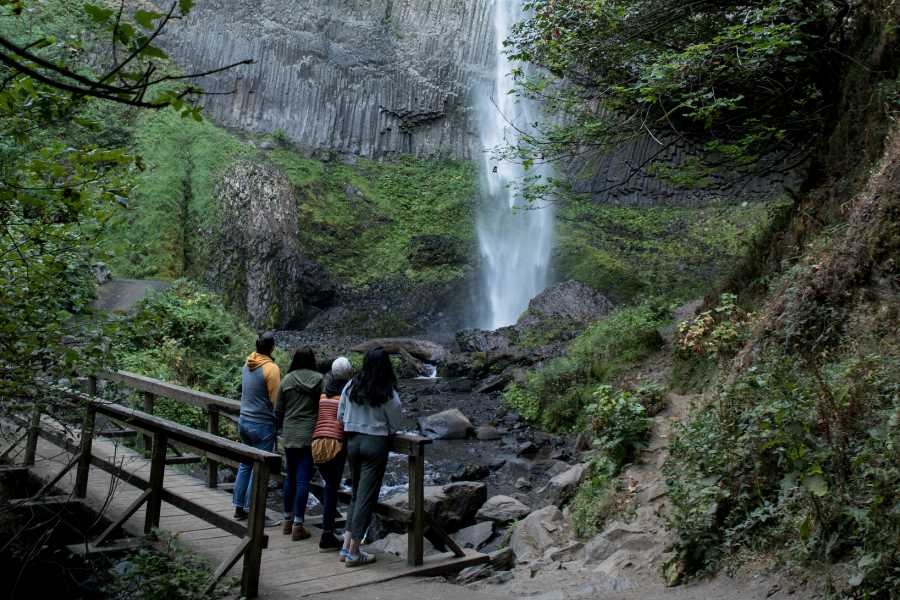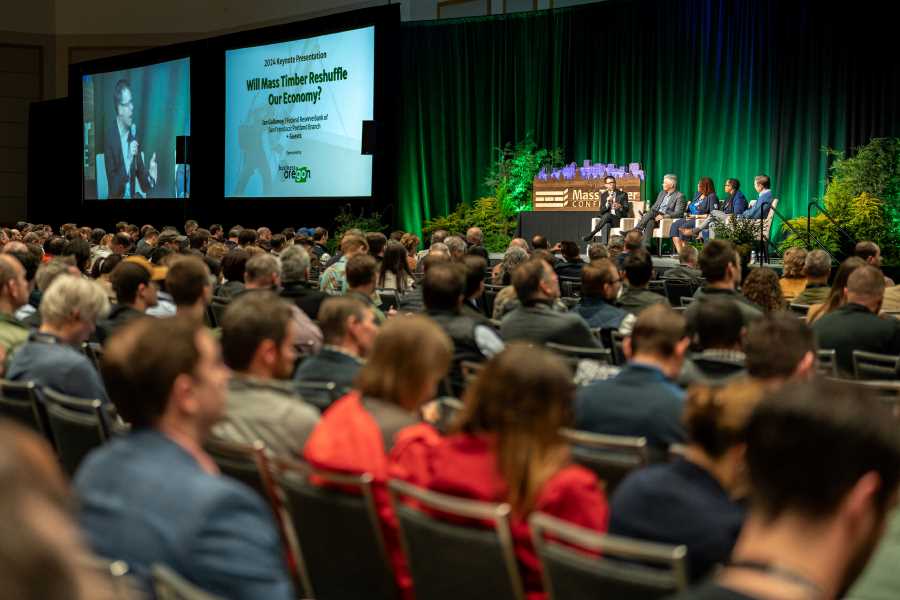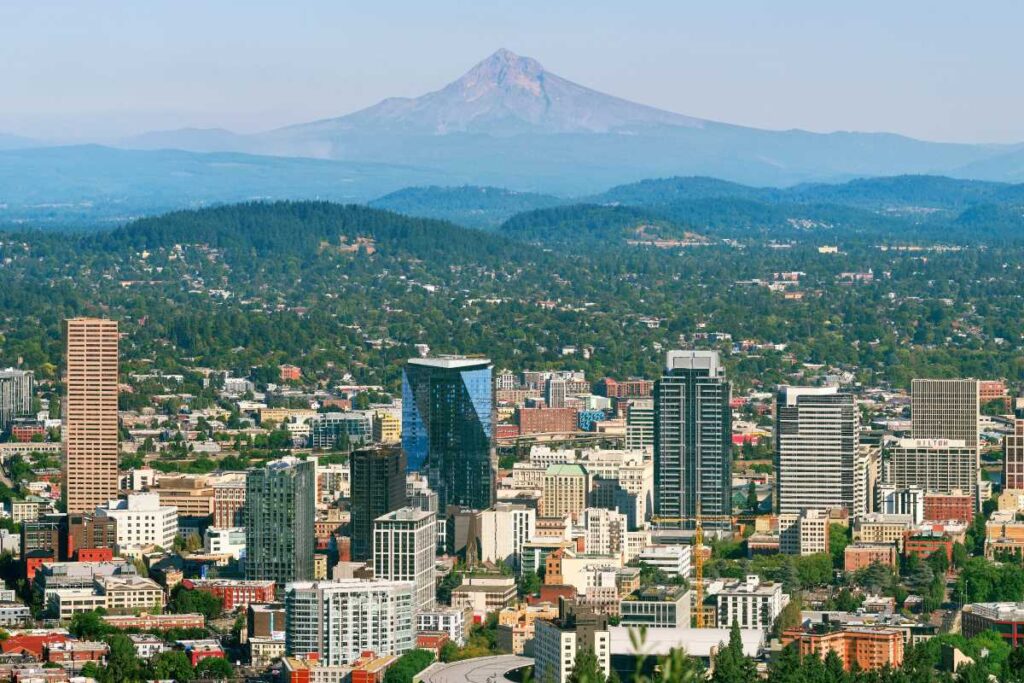This content was created in partnership with Travel Portland and SkiftX, Skift’s branded content studio.
It’s hard not to be inspired by Portland’s natural beauty. A modern foodie city in the heart of the Eternal Forest, Portland is home to outdoor adventurers, cutting-edge creatives and entrepreneurs, and some of the biggest names in sportswear, technology, and biomedical research.
Portland’s unique Pacific Northwest appeal also makes the city highly attractive to event planners looking to get more out of their next host destination, as well as attendees looking to combine business and leisure travel. Meeting planners continue to face difficulties, but a lack of jobs is not one of them. The challenge now is to do more with less, starting with choosing the right venue.
Knowland’s 2024 State of the Meetings Industry Report found that about 42% of planners expect to book more meetings, with less than 10% expecting fewer. Data to date supports these predictions: Knowland’s recently released Hotel Group and Business Performance Index showed a 25% increase in attendance and a 31% increase in booked meeting space.
Mid-sized destinations bring greater appeal
While planners may no longer have to worry about lagging demand, a new set of challenges is replacing the upheaval of the past few years. Just when attendees expect more value from their events, costs are rising. To adapt to the needs of this market, meeting planners are turning to mid-sized destinations to deliver exceptional experiences while keeping budgets under control.
Knowland reports that 53% of planners are looking to the secondary market for this very reason. “This shift opens up opportunities for second- and third-tier destinations, particularly those with attractive experiential value propositions, best-in-class product quality and premium service levels,” the report states.
In addition to great venues and high-quality services, what else should planners look for? To help identify more ways the destination provides value beyond the meeting room, Skift Meetings partnered with Travel Portland to reveal some of the city’s biggest benefits for meeting planners and attendees.
From waterfalls to wine tastings: Why attendees blend business with pleasure in Portland


Deloitte’s 2024 Travel Outlook found that “laptop travelers” who combine work and leisure will travel more frequently and for longer periods of time, and meeting location is a key factor in their decision to attend meetings. Choosing a host destination with casual appeal can increase attendee numbers, said Desiree Everett, vice president of convention sales and services for Visit Portland. “For convention groups, people often come early or stay after the convention to experience the experience. the area.
There are many reasons why Portland attracts people to extend their trip, from the stunningly diverse landscape to the vibrant local culture and cuisine. Breathtaking views of the nearby Cascade Range and Mount Hood make for unforgettable hiking and scenery. The Columbia River Gorge has more than 90 waterfalls for visitors to view (and take photos under), and the vast Washington Park allows you to get closer to nature from downtown.
Further afield, small towns, art galleries, and historic lighthouses dot Oregon’s 363 miles of coastline. If tourists want to taste Portland’s local original wine directly, the world-famous Willamette Valley has more than 600 wineries, 6 of which were selected as the “Wine Spectator”‘s 2023 Top 100 Wines.
Industry-specific off-site events to expand attendee knowledge
While Portland has much to excite visitors, the city is also home to clusters of specific industries, including athletic apparel, healthcare, and a high-tech ecosystem ranging from well-known software companies to specialized scientific applications. For conferences in these core areas, this kind of attendance is an added benefit, providing opportunities to engage with thought leaders, sponsors, and the educational community. Attendees can expand their knowledge and unleash their passion through field trips, industry-specific events and meetings with industry experts.
Additionally, the lush landscape and innovative development in and around Portland can provide fertile ground for putting theory into practice.
Natural Sciences and Agriculture
A volcanic region with abundant fertile land, Portland is a natural center for scientific groups interested in geology or volcanology, as well as those related to wineries or other agriculture. Likewise, local landscaping is an ideal complement for meetings focused on outdoor recreation.
Restore, protect and build sustainably


The region offers equally as many opportunities for those working with forest resources, whether the focus is on conservation or the sustainable management of the resources. The Land Trust Alliance and Mass Timber recently launched offsite events at industry-specific locations in the city. The Land Trust Alliance toured major land trust restoration projects in the area, with the added bonus of a bike tour of local parks, neighborhoods and delicious treats from Portland’s thriving food truck scene. Meanwhile, the International Mass Timber Conference continues its construction and fabrication journey, showcasing real-life examples of innovative and sustainable mass timber construction, making the case for a new era of mass timber construction using the latest technologies. Highlights include an inside look at the ongoing renovation of Portland International Airport’s new terminal, which features towering arches made from local wood.
Sportswear and Outerwear Brands
The Portland area’s natural landscape of forest trails, snowy mountains and rushing rivers also makes it a mecca for activewear and outerwear brands, who use it as a proving ground for designing and prototyping products. Nike, Columbia Sportswear, Keen Footwear and Danner Boots are all headquartered in the area, while Adidas and Under Armor also have offices.
high tech
Portland and its surrounding areas are known as the “Silicon Forest” due to the area’s attraction to technology brands. The scale of its software industry is 53% higher than the national average, and brands such as Intel, HP, Siemens, Tektronix, Navex Global, ZoomInfo, New Relic, Vacasa and Oracle all have offices in the region. It is also home to medical groups and life sciences-related organizations, with a large teaching hospital, Oregon Health & Science University, and several bioscience companies specializing in genetics and cancer treatment. The region’s unique natural conditions mean the city has more than its fair share of climate technology organizations—the number of life scientists, conservation technicians, and biotechnologists living in Portland is twice the national average.
Food Brands and Franchise
Finally, Portland’s reputation as a favorite among foodies has attracted many food and beverage companies to set up shop here. Larger areas can call Bob’s Red Mill, Pacific Foods, Pacific Seafood, Tillamook Cheese, Steven Smith Teamaker and Reser’s Fine Foods local businesses.
A welcoming destination where fairness comes first
When Knowland asked planners to identify their top three meeting trends, DEI topped the list, with 60% of respondents citing it as a priority. A good DEI reputation can influence potential attendees’ registration decisions, not to mention their experience of the event.
As a city that strongly supports and accepts the LGBTQ+ and BIPOC communities, Portland is well-positioned to give attendees what they are looking for in terms of DEI. In fact, Travel Portland prefers to call it EDI, putting fairness first. “Visit Portland decided to lead with equity because, most importantly, we are committed to leading with equity,” said Angela Nelson, CTA, Visit Portland’s Vice President of Equity and Partnerships .
Portland is home to several LGBTQ+ businesses, support groups, and prominent figures. There are also local grassroots organizations that support BIPOC businesses and artists, such as My People’s Market. These efforts make it a natural choice for conferences seeking to build a two-way sense of engagement with local communities.
SACNAS: A shining example of EDI
For example, the Society for the Advancement of Chicano/Hispanic and Native American Sciences (SACNAS) is keen to build local connections to strengthen their conferences and increase opportunities for the students and professionals who attend them. Thanks in part to Portland’s partnerships, affordable services are available to a wide range of constituents, including diverse student populations. Attendees come from community colleges, tribal colleges and universities, with degrees ranging from undergraduate to postdoctoral.
Additionally, SACNAS hosted a staff retreat in Portland prior to the conference to allow team members to preview offerings in the region—insights that later came in handy when encouraging attendees to get out and explore. Reflecting their commitment to inclusivity, event organizers not only fostered a spirit of collective empowerment and active participation for attendees, but also welcomed locals to share their experiences. In keeping with this philosophy, they host community receptions before and after reservations and open a homegrown market featuring locally made art to the public.
Visit travelportland.com/meetings to learn how Visit Portland can help you plan an event that takes advantage of the area’s recreational activities, industry expertise and network of local community organizations.
This content was created in partnership with Travel Portland and SkiftX, Skift’s branded content studio.

